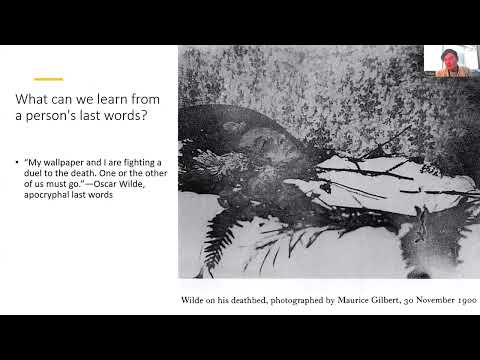 Speaker: Tristan Reid @tristanreid
Speaker: Tristan Reid @tristanreid
 Affiliation: University of Helsinki
Affiliation: University of Helsinki
Title: The Implied Author and the Case of Deathbed Literature
Abstract (long version below): This interdisciplinary study examines deathbed literature to explore the implied author (IA) concept, revealing how impending mortality shapes authors’ creative choices. By synthesizing death studies, computational methods, and narrative theory, I analyze how authors confront mortality, negotiate legacy, and project persona through their final works. Through close readings and computational stylistic analysis of authors like Katherine Mansfield and Bruce Chatwin, this research illuminates the interplay between personal experiences, artistic expression, and projected personas in deathbed literature. The study contributes to understanding authorial intention, contextual meaning, and the IA, offering insights into how authors navigate mortality and shape their literary legacies.

 Long abstract
Long abstract
Deathbed literature presents a unique lens through which to examine the implied author (IA) concept and its implications for literary interpretation. This interdisciplinary research, which is a work-in-progress, synthesizes narrative theory, death studies, and computational methods to investigate how impending mortality influences authors’ creative choices and shapes the textual landscape of their final works. Informed by debates surrounding the death of the author, this study seeks to unravel the complexities of authorial intention and contextual meaning in “deathbed literature,” which I define as literature produced after an author receives a terminal diagnosis.
This research aims to uncover the thematic fixations and creative strategies employed by authors facing terminal diagnoses. By examining the works of authors like Mansfield and Chatwin, I seek to identify patterns and stylistic features that reflect their responses to mortality and impending death.
The study’s methodology combines close reading with computational stylistic analysis to provide both qualitative and quantitative insights into the phenomenon of deathbed literature. Through close readings of texts, including exploration of diaries, letters, and biographical material, I analyze pre- and post-terminal diagnosis writings, shedding light on how authors grapple with mortality and negotiate their literary legacies.
Furthermore, death studies contribute to a broader understanding of societal attitudes and beliefs surrounding death, situating deathbed novels within their historical and cultural contexts. By contextualizing authors’ creative responses within broader societal frameworks, this research aims to illuminate the nuanced thematization of death in literature and its impact on creative expression.
Computational tools and quantitative methods play a pivotal role in this research, allowing for systematic exploration of authors’ writing styles and linguistic markers associated with themes of mortality and personal reflection. For instance, through diachronic linguistic analysis of Mansfield’s corpus, I trace shifts in her language use in response to her terminal diagnosis, informed by both computational findings and theoretical insights from death studies.
The central question guiding this study is the role of the IA in deathbed literature and how computational methods can elucidate its manifestations within texts. By identifying linguistic markers and stylistic patterns associated with the IA, this research aims to contribute to ongoing debates surrounding authorial intention and textual interpretation.
In conclusion, this research offers a unique analysis of deathbed literature, examining how authors confront mortality, negotiate their legacies, and project personas through their final works. By synthesizing diverse methodologies and engaging with interdisciplinary debates, this study sheds light on the complexities of authorship, mortality, and the textual construction of the IA in literature.

